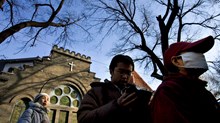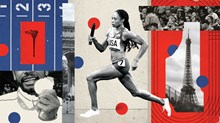According to James Wood, the most influential commentator on the contemporary novel, "Christian fiction" is an oxymoron—assuming, that is, that "fiction" here means the major leagues and not some lesser form of the art, beneath Wood's notice. Helen Vendler, Wood's counterpart in the domain of poetry, agrees. "We"—we who have tasted the forbidden fruit of modernity—have been permanently disabused of the illusions of faith, and Christian faith in particular.
The 2,000 or so people who gathered this past weekend at Calvin College in Grand Rapids, Michigan for the Festival of Faith & Writing would beg to differ. Starting late Thursday morning and ending Saturday night with Frederick Buechner's magnificent lecture and reading, festivalgoers heard fiction-writers and poets for whom faith and writing are inextricably connected: Bret Lott, Katherine Paterson, Leif Enger, Luci Shaw, Li-Young Lee, Scott Cairns, and dozens more.
One of the principles of the event is to mix the famous, the well-known, and the not-yet-known. (Kudos to Paraclete Press for inaugurating this year a fiction prize for new and emerging writers.) Since I started attending, just a few months after the first issue of Books & Culture appeared, each time I have come home with a list of writers to read—and a stack of books from the festival array. (Several people told me that Silas House, a young writer who read from his novel A Parchment of Leaves, belongs on that list.)
As in festivals past—this is an every-other-year happening at Calvin—the definition of "writing" was expansive, as it should be. So the menu featured all sorts of writers: essayists and preachers (Barbara Brown Taylor was one of the keynoters), memoirists (there was long book-signing line for Lauren Winner's Girl Meets God), and liturgists and songwriters. For my wife Wendy, who has been to three festivals now, the highlight among a number of first-rate sessions was a performance of Arthur Giron's play about Edith Stein, the Jewish philosopher who converted to Catholicism, entered a convent, and died at Auschwitz. I also heard rave reviews for the mystery writer Michael Malone and the funeral director Thomas Lynch, among others.
Easily the most controversial speaker this year was Joyce Carol Oates, who gave Friday night's plenary address and was interviewed Saturday morning by Dan Taylor. Not that Oates was at all provocative in her remarks, as some might have expected. On the contrary, as an outsider she was clearly trying to reach out to the audience. Many people told me that they found her talk disjointed, condescending, and woefully ignorant of what faith really means. They asked why she was invited in the first place. I disagreed—I found her talk interesting, and the interview even more so—but disagreement is the spice of our response to writing in all of its forms.
In fact, wonderful as it was—the largest and, for me, the best festival to date, enhanced this time by the addition of the splendidly appointed Prince Conference Center—Festival 2004 could have done with a bit more spice, a bit more edge, and less treacle. Many people loved Leif Enger, whose novel Peace Like a River was a huge success. He was charming and gracious, and he has a voice that excites envy. (No surprise that he was on Minnesota Public Radio for many years.) And yet his talk, delivered to a packed fieldhouse audience, was hard for me to get down. "Radical Innocence," it was called, but it struck me as a more sophisticated version of All I Really Need to Know I Learned in Kindergarten. (I did enjoy his brief reading from The Wind in the Willows.)
There was a bittersweet aspect to this year's event. Dale Brown, who has been directing the festival since 1990 with the help of colleagues in Calvin's English department, is stepping down. He will be a hard act to follow. Those who have come to find a community in this gathering—a far-flung fellowship, if that word hasn't been worn out, reunited every other year with new faces, too—will be fervently hoping and praying that Calvin will continue the tradition.
On Saturday afternoon, I was talking with a friend who had come to the festival for the first time. It was good, he said, very good—and yet, he wondered, what finally was the point of it? What was the mission statement? I told him I thought the mission statement (if there has to be one: in heaven, you can be sure, there will be no mission statements) was contained in the name of the event: it's a feast of faith and writing. On these feast days we celebrate together, as if around a table (anticipating the great banquet that will mark the restoration of all things), and then we return, enriched, to our "ordinary" lives.
Copyright © 2004 Christianity Today. Click for reprint information.
Related Elsewhere:
Previous dispatches include:
Writing Faithfully | A dispatch from Calvin College's Festival of Faith & Writing (April 3, 2000)
A Grave in the Air, a Soul Dancing | Two remarkable collections of Holocaust testimony.
Books & Culture Corner appears every Monday. Earlier editions of Books & Culture Corner and Book of the Week include:
A Curious Contingency | Confessions of a wordsmith. (April 05, 2004)
"Trust but Verify" | Ronald Reagan's faith. (March 29, 2004)
Baseball Preview 2004 | Plus a look back with some Negro League veterans. (March 29, 2004)
How Do You Live with a Torturer? | A novel of Haiti by the brilliant young writer, Edwidge Danticat. (March 08, 2004)
God Is in the Details | A scientist affirms his faith. (Feb. 23, 2004)
History Repeats Itself, Sort of | How the fate of Eugene McCarthy's insurgency against LBJ sheds light on the 2004 presidential campaign. (Feb. 16, 2004)
The Worst President Ever? | Former Nixon aide John Dean attempts to rehabilitate the reputation of Warren G. Harding. (Feb. 09, 2004)
Wholly, Wholly, Wholly | Calvinists and conga drums in Grand Rapids: a report from the seventeenth annual Calvin Symposium on Worship and the Arts. (Feb. 02, 2004)
The Doom of Choice | Fate, free will, and moral responsibility in Tolkien. (Feb. 02, 2004)
A Rose Among Thorns | A new novel by the author of Father Elijah illumines the spiritual consequences of our simplest decisions. (Jan. 26, 2004)
Baptized in Fire | A new book on Martin Luther King, Jr., emphasizes his spiritual transformation. (Jan. 19, 2004)
O'Connor v. the Antichrist (Jan. 12, 2004)
Moody, the Media, and the Birth of Modern Evangelism | A cautionary tale. (Jan. 05, 2004)
A Few Coming Attractions from 2004 | Plus: What to buy with those gift cards, and some of the books in my to-read stacks. (Dec. 29, 2003)
The Top Ten Books of 2003 | Plus: The Worst Book of the Year, more good reading, digital books, and a little Christmas music. (Dec. 22, 2003)
Books at Warp Speed | We continue our annual roundup of noteworthy books. (Dec. 15, 2003)
Is "Sensual Orthodoxy" a Contradiction in Terms? | Read this unconventional collection of sermons and judge for yourself. (Dec. 8, 2003)
Books, Books, Books! | We begin our annual roundup. (Dec. 8, 2003)
Urban Eden | In City: Urbanism and Its End, a new history of New Haven, Connecticut, the city (in its late 19th-century form) is an ambiguous heaven-and the suburbs that relentlessly followed are hell. Which leaves us where, exactly? (Dec. 01, 2003)
Cool Drink of Water | A poet's voice in the evangelical wilderness.
Faith, Hope, and Charity in North Carolina | New novels by Michael Morris—whose first novel, A Place Called Wiregrass, was a word-of-mouth hit— and Jan Karon, who continues her beloved Mitford saga. (Nov. 17, 2003)

Support Our Work
Subscribe to CT for less than $4.25/month

















